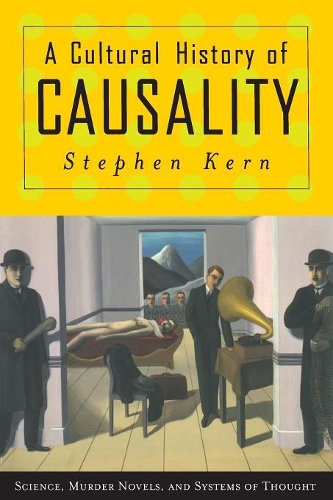
A Cultural History of Causality: Science, Murder Novels, and Systems of Thought
(Paperback)
Publishing Details
A Cultural History of Causality: Science, Murder Novels, and Systems of Thought
By (Author) Stephen Kern
Princeton University Press
Princeton University Press
17th October 2006
United States
Classifications
Professional and Scholarly
Non Fiction
809.93384
Physical Properties
Paperback
448
Width 152mm, Height 235mm
680g
Description
This pioneering work is the first to trace how our understanding of the causes of human behavior has changed radically over the course of European and American cultural history since 1830. Focusing on the act of murder, as documented vividly by more than a hundred novels including Crime and Punishment, An American Tragedy, The Trial, and Lolita, Stephen Kern devotes each chapter of A Cultural History of Causality to examining a specific causal factor or motive for murder--ancestry, childhood, language, sexuality, emotion, mind, society, and ideology. In addition to drawing on particular novels, each chapter considers the sciences (genetics, endocrinology, physiology, neuroscience) and systems of thought (psychoanalysis, linguistics, sociology, forensic psychiatry, and existential philosophy) most germane to each causal factor or motive. Kern identifies five shifts in thinking about causality, shifts toward increasing specificity, multiplicity, complexity, probability, and uncertainty. He argues that the more researchers learned about the causes of human behavior, the more they realized how much more there was to know and how little they knew about what they thought they knew. The book closes by considering the revolutionary impact of quantum theory, which, though it influenced novelists only marginally, shattered the model of causal understanding that had dominated Western thought since the seventeenth century. Others have addressed changing ideas about causality in specific areas, but no one has tackled a broad cultural history of this concept as does Stephen Kern in this engagingly written and lucidly argued book.
Reviews
"[An] ambitious book... [Kern's] focus on murder keeps things pleasantly lurid, and his erudition and passion shine through on every page."--Publishers Weekly "Thoughtful and carefully done, the fruit of considerable research."--Richard A. Posner, Science "Kern has mastered the novels, the critical literature, and the works by philosophers and sociologists bearing on his thesis... [R]eaders familiar with the novels will see them in a new light."--Jonathan Beard, Scientific American "As a history of science and ideas, Kern's study succeeds brilliantly. Gathering the disparate knowledge systems of nearly two centuries into discrete categories, Kern produces a taxonomy of causality that is cogent and convincing... From Enlightenment positivism to quantum discontinuity; from religion to existentialism, and phrenology to cybernetics; from Freud to Nietzsche to Foucault, and from Darwin to Durkheim to Derrida: Kern ranges comfortably (and profitably) among them all. Specialists and novice alike will find much hereto learn and admire."--Peter Okun, American Historical Review "Murder stories, Kern argues, are a sort of cultural repository of thoughts about causality, of how things fit together. From the pseudo-scientific deductions of Conan Doyle to the postmodern self-reflections of Don DeLillo, Philip Kerr and Robert Coover, detective stories demonstrate how we cope with the biggest contingency of all: conscious killing."--Mark Kingwell, The Globe and Mail "Causality, Stephen Kern concedes, is hard to define and even harder to prove... [T]his book is highly recommended to everyone interested in smart and engaging interdisciplinary scholarship."--Peter Okun, American Historical Review "[An] impressive study of causality... Kern offers some fascinating insights into the relationship between science and literature, as well as the history of our attempts to explain the why and wherefore."--PD Smith, The Guardian
Author Bio
Stephen Kern is Humanities Distinguished Professor of History at Ohio State University. He is the author of "The Culture of Time and Space, The Culture of Love", and "Eyes of Love".
